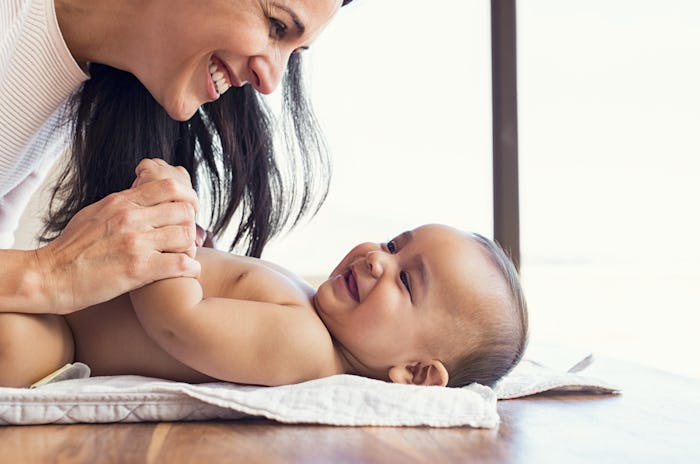Life

This Viral Postpartum Photo Shows What To *Really* Expect After Having A Baby
Women, and mothers in particular, have many unrealistic expectations thrust upon them by society. What's worse, some even internalize these expectations, and feel like failures when they don't live up to someone else's fairytale idea of what she "should" be. But one mom's candid 6-day postpartum photo is going viral on Instagram, and with each view, she's destroying the ridiculous notion that a woman should — or even can — "get their body back" right after giving birth.
Even the way we talk about it is misleading. To "get your body back" implies that it's gone somewhere, lost or stolen, or thrown away. Pregnant women aren't ghosts, dude. It's the same body, just somewhat larger and differently shaped. Over the course of a lifetime, with or without pregnancies, every human body is going to vary from month to month, year to year, and decade to decade. So really, we're just talking about a postpartum woman losing that extra weight and returning to the same exact dimensions that she was before pregnancy. And I hate to be the bearer of bad news, but here's something everyone, whether or not they have a uterus, needs to know: for most, that's not even physically possible. I'm sorry! More on that later.
Jean Wang is a fashion blogger who recently had a baby. Since giving birth, she's been sharing photos of her postpartum style, in which she appears to have a flat stomach. That didn't sit well with some followers, so on Wednesday night she bared it all — well, nearly all — posing on Instagram in nothing but a pair of mesh underwear and a gorgeous zebra swaddling blanket that I'm extremely jealous of. But the real focus is her stomach, which is actually far from flat. "6 months pregnant or 6 days postpartum?" the caption read. Most probably would have guessed the former, had she not included a newborn in the photo.
Loved reading through your dialogue on the realities of postpartum in my latest blog post. One of the first comments I got after leaving the house again was that I still looked quite pregnant. It just showed how there's a lack of candid info about the birth and recovery process. These weeks have brought some of the most extreme highs and lows, as I'm learning how to care for both my little one and for my new self - physically, mentally and emotionally. But through all the challenges, it has really shown me how resilient and incredible our bodies can be.
And for those who think that Wang still looked pregnant after pregnancy because she's "Extra Petite" (that's the name of her blog, but also an accurate description of her sub-5-foot frame), or worse, because she wasn't trying hard enough, listen up: the average woman gains around 30 pounds during pregnancy, give or take quite a bit. The average baby weighs 7 or 8 pounds, and according to the Mayo Clinic, the placenta and amniotic fluid, AKA the only other two things that leave a mother's body immediately, account for just 3-1/2 more. The rest of it is made up of extra fluids, enlarged reproductive organs, and yes, some fat, as nature intended, and it's not going to drop off the moment the baby's out of there. It can't.
Of course, it is possible to eventually lose that weight, but it will likely take months. That's OK! That's normal! However, a mother's postpartum body won't be exactly as it was before, which is also OK and normal, believe it or not. Every human is different, but the uterus takes about 3 months to shrink back to size, according to the Archives of Gynecology and Obstetrics, and USA Today has reported that two thirds of mothers will experience a change in breast size after pregnancy; one-third end up with bigger ones, and one third with smaller. And that's apart from the sagging, (which has nothing to do with breastfeeding, FYI). Some moms also walk away from the ordeal with larger feet, wider hips, or a change in hair texture.
These things can't be helped. This is what happens when your body becomes two bodies for the better part of a year, then changes back to one. Pregnancy and childbirth changes everything; your family is larger now, your heart grew three sizes, and you're never buying another white carpet as long as you live. Why should we expect the body that made it all happen to be any different?